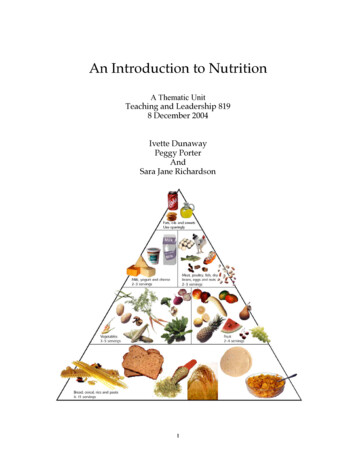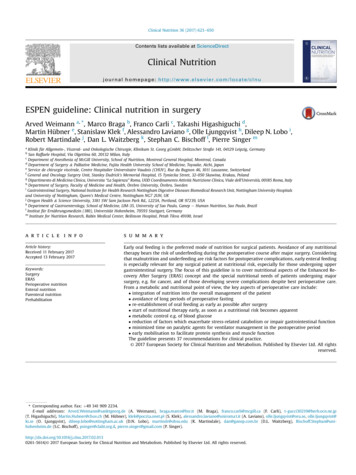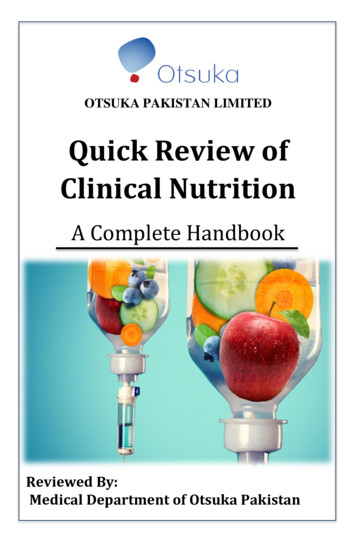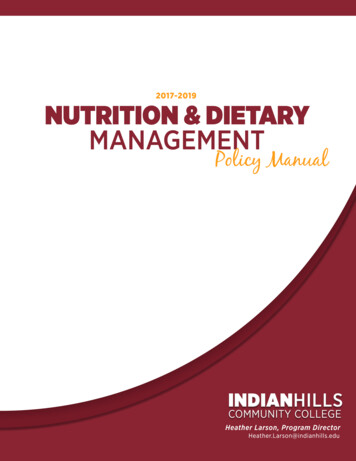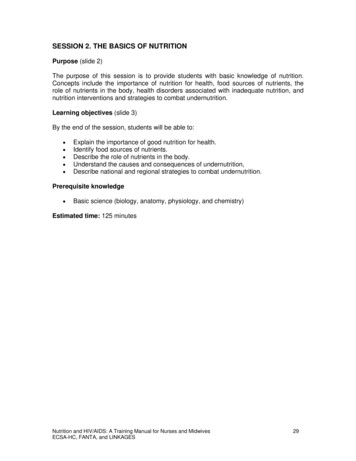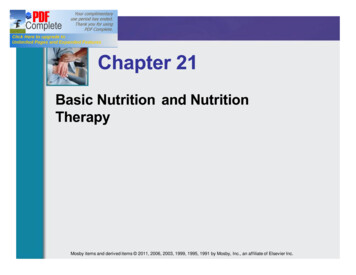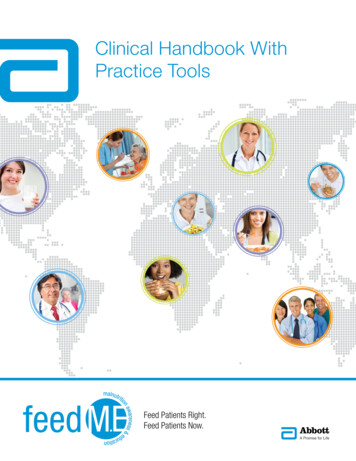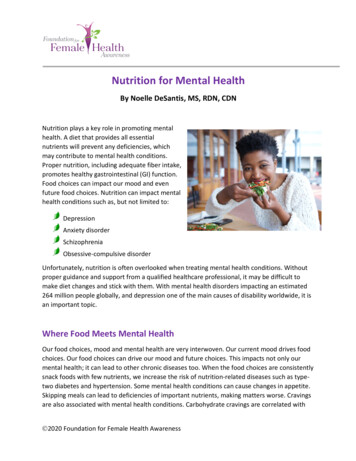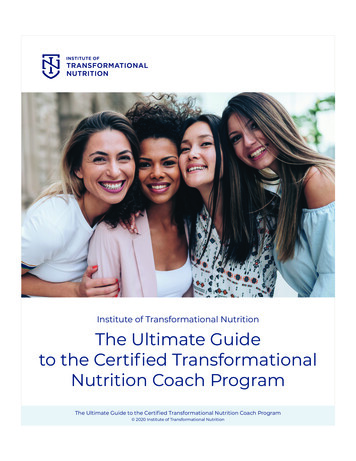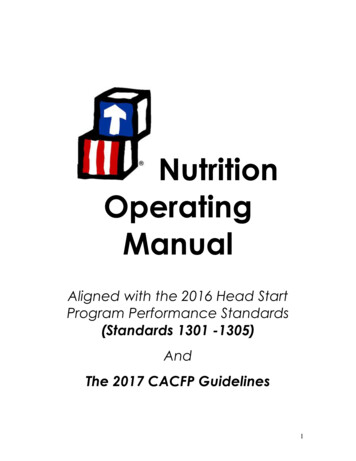
Transcription
NutritionOperatingManualAligned with the 2016 Head StartProgram Performance Standards(Standards 1301 -1305)AndThe 2017 CACFP Guidelines1
2
Table of ContentsCHILD NUTRITION . 4Nutritional Services: . 5Meal Service: . 5Family Assistance: . 5Safety: . 6CLASSROOM NUTRITION ACTIVITIES . 6FIELD TRIP POLICY . 6BIRTHDAY PARTY POLICY . 7FOOD EXPERIENCES . 7MEAL TIME. 8CANDY POLICY . 8TOOTHBRUSHING . 9FOOD ALLERGIES AND DIETARY RESTRICITON POLICY . 10MENU PLANNING PROCEDURE . 11CHILD NUTRTITION ASSESSMENT . 11ANEMIA TESTING . 11GROWTH ASSESSMENT . 12OVERWEIGHT / UNDERWEIGHT/ SHORT STATURE . 13NUTRITION NEWSLETTER . 13CLEANING AND SANITIZING POLICY . 13FOOD SAFETY AND QUALITY . 14FIRST IN / FIRST OUT . 15FOOD TEMPERATURE . 15USE OF DISPOSABLE DISHWARE . 15NUTRITION PERSONAL APPEARANCE AND EMPLOYEE CLEANLINESS . 16ATTENDANCE AND MEAL COUNT . 16DAILY MEAL PRODUCATION RECORD . 17CLAIM FOR REIMBURSEMENT WORKSHEET . 18TEMPERATURE LOG . 18MONTHLY KITCHEN INVENTORY . 19NUTRITION COMPONENT FOOD / NONFOOD INVOICES . 19TRAINING . 20CACFP CONTRACT . 203
CHILD NUTRITIONPerformance Standard: 1302.42 (b), 1302.44Policy:a. Child Wellness is promoted by providing nutritious meals andsnacks that will supplement and complement those served athome. Nutritional services assist families in meeting individualnutritional needs, and establishment of good eating habits that willnurture health development and promote lifelong well-being.Nutritional services include identification of individual nutritionalneeds, the design and implementation of nutritional servicesprograms, meal service, and family assistance with nutrition andfood safety and nutrition.Procedure:1. Identification of each child’s nutritional needs:b. Nutritional and Medical assessments are completed, as a part ofthe Acceptance Packet.c. Emergency Information including medications taken by the child,food drink or medication allergies, special diet and religiousrestrictions, is obtained as a part of the Acceptance Packet and isupdated throughout the year.d. Physician statement is obtained for special diets, food/medicationallergies or food intolerances.i. Height and weight is conducted upon the first 45 days ofentry into the program.ii. A second Height and Weight is done for those childrenbelow the 5% and above the 95%.iii. Hematocrit and/or Hemoglobin will be assessed during thefirst 45 days of beginning class.iv. Documentation of HCT from the physician’s office or WICwill be acceptable and should be filed in the child’s file.v. For those children with no documentation,1. Family Service Worker will inform the parents of theneed for the documentation of HCT/Hemo., followingthe THStep Periodicity Schedule.2. If no documentation of HCT/Hemo. is obtainable,Family Service Worker will assist the parents ingetting the procedure completed. Refer to Referraland follow-up Procedure.3. If a child is less than 5 years old and not enrolled inthe WIC Program, Family Service Worker will make areferral (follow referral Procedure). If the familydenies or drops WIC, Family Service Worker willobtain a ‘Denial of Services’ form.4
Nutritional Services:a. A Registered Dietician will be consulted for approval on newmenus.b. Menus will reflect cultural and ethnic preferences by providingmulti-cultural items.c. A variety of healthy foods including bread/grains, vegetables, fruits,meat/meat alternatives and milk/ milk products will be served.d. Modifications will be made for those children with disabilities thatrequire special diets.i. The Nutrition Manager, Disabilities Manager, and RegisteredDietician will coordinate with the child’s medical provider tomake these modifications.e. CACFP will be the primary source of reimbursement for mealsMeal Service:f. Children attending full day settings will receive 2/3 of theirnutritional needs through meals and snacks.g. All children arriving at the campus in the morning will be offered abreakfast.h. Foods will be high in nutrients, low in fat, sugar and salti. Meal and snack periods will be appropriately scheduled andadjusted, where necessary, to ensure that individual needs are met(refer to CACFP guidelines).j. Teaching staff will provide dental hygiene in conjunction with ameal (refer to Oral Hygiene Procedures).k. Teaching staff will promote dental hygiene by modeling andparticipating in dental hygiene.l. Food is not used as punishment or rewardm. Children are encouraged, but not forced to eat or taste foods.n. Family style meals will be observed and sufficient time will beallowed for eating.Family Assistance:o. Parents will be provided with education in good nutrition, using:i. One-on-One consultation,ii. Parent meetingsiii. Coordination of community servicesiv. Periodic handoutsv. Menusvi. Other nutrition informationp. Nutritious foods will be provided at parent functionsq. Referrals will be made to a Registered Dietician, as needed.r. Education and Health Specialists will coordinate nutrition anddental curriculum for the classroom.i. Education Specialist will ensure:1. implementation of curriculum2. Documentation of curriculum in lesson planss. Family Services Specialist will coordinate with Nutrition Managerand Health Specialist to provide5
i. Opportunities for parent involvement andii. Education of families in good nutrition and dental practicest. Family Service Specialist will ensure:i. Family Services is providing assistance to the families tomeet their individual needsii. Documentation is in the child’s file; including each family ofthe WIC program and ensuring services are being providedand followed-up.Safety:Food safety and nutrition will be deferred to kitchen nutrition policyand procedure.CLASSROOM NUTRITION ACTIVITIESPerformance Standard: 1302.31 (1) (2) (e)Policy:Classroom Nutrition Activities will be offered in conjunction with curriculumon a weekly basis. A Food Experience will be offered in conjunction with thecurriculum on a monthly basis.Procedure:1. Lead Teacher will review the curriculum and pick a nutrition activity twoper month that coincides with the educational concepts for the month.2. Education Specialist will pick a nutrition food experience for theclassrooms that will be done on a monthly basis.3. Lead Teacher will document in Lesson Plan of the Food- RelatedActivity4. Food experiences will be implemented in the classroom curriculum(Refer to Education Policy and Procedure).FIELD TRIP POLICYCACFP: 4153Policy:When a classroom field trip is scheduled, the Lead Teacher must makeplans for the children to eat sack lunches. All field trips lunches must haveapproval from the Nutrition Manager.Procedure:1. Field trip is tentatively scheduled.2. Campus Director completes a field trip request form3. Campus Director sends completed form to Education Specialist forApproval4. Education Specialist Approves Field Trip and sends to NutritionManager for Approval6
5. Nutrition Managers reviews to make sure we are in compliance withUSDA Regulation.6. Nutrition Manger returns to Education Specialist for final approval.7. Cook will prepare lunches for all children the morning of the field tripand pack in an ice cooler.BIRTHDAY PARTY POLICYPolicy:All birthdays will be observed one day a month.Procedure:1. The Campus Director will designate one day a month that all birthdaysin the campus will be observed that does not fall on a child’s birthday.2. The Campus Director will inform the Cook if there are any childrenhaving a birthday each month.3. The Cook will cook a cake or cupcakes for all the campus children inhonor of the birthday children.4. Campus Directors on ISD Campuses will purchase small cupcakesusing their petty cash or at a local store that we have a charge accountwith.FOOD EXPERIENCESPolicy:Food served to the children must be nutritious and provide variety, inadequate amounts to ensure growth and development. Food experiences maybe conducted in the classroom under the instruction of the teaching staff.All children on Child Care License Campuses must be offered breakfast, lunch,and 1 snack. Foods served will be high in nutrients, low in fat, sugar, and salt.Children will be encouraged but not forced to eat. Children with special dietsmust have foods provided to meet their needs. All staff, children and volunteersmust follow good hand washing practices. Staff and volunteers must promoteeffective dental hygiene in conjunction with meals.Procedure:1. Registered Dietician consultant will review and approve menus foreach school year.2. Children on Child Care Licensed Campuses will be served breakfast,lunch and PM snack each day.3. The children on Independent School Districts will receive theirrequirements at breakfast and lunch.4. Campus staff provides Family Style meal environment providingencouragement, but not forced, to eat or taste food.5. Physician statement will be obtained for special dietary needs.6. Consulting Dietician will review and approve special menus as needed.7
7. All staff will follow proper hand washing techniques (Refer to handwashing procedure).8. Teaching staff will ensure proper tooth brushing in conjunction with ameals (Refer to Oral Hygiene Procedure).MEAL TIMEPerformance Standard: 1302.44 1302.31 (2) 1302.90 (c) 1 (d)Policy:Children learn appropriate eating patterns and meal time behavior. Mealtime provides a range of opportunities that support the development andsocialization of children.Procedure:1. Meals are served family style with the children as helpers setting the table.They are responsible for cleaning up spills, scraping their plates, puttingtheir trash in the garbage can.2. Children are encouraged to taste all foods but not forced to eat anything.Teacher’s model appropriate family style behaviors, including tasting allfoods. Teacher’s plate has to look like students; they receive the fullbalanced meal.3. No other food will be allowed in the classroom unless it is for a cooking ornutrition activity.4. Food is not used as reward or punishment.5. If dessert type foods (fruit) are served, they may be eaten at any timeduring the meal.6. Conversation is encouraged during mealtime.7. Trays will be used later in the year for transitioning students.CANDY POLICYThe subsequent outline should be followed regarding candy/sweets:1. The parent committee must vote on whether or not candy may begiven to the children on special occasions and holidays. (This must bevoted on and documented prior to any candy being distributed).2. If the parent committee votes unanimously that the children mayreceive candy, the following stipulations must be followed. (If even oneparent votes “no candy” the entire campus will be prohibited fromdistributing candy).i. Candy must be donated by the parent committee. (HeadStart will not purchase candy at any time for any reason).8
ii. Candy may not be consumed on the premises of theHead Start Campus at any time. (Not even on specialoccasions, holidays or field trips)iii. Candy may not be consumed on the Head Start Bus.(Not even on special occasions, holidays or field trips)iv. Head Start Children who attend field trips to the NursingHome where candy is provided may consume areasonable amount of candy provided the parentcommittee has approved it.v. If candy/sweets are consumed at any time for anyreason, the children must immediately brush their teeth.vi. Classroom Nutrition Activities that include candy/sweetsin the lesson plan will be substituted with more nutritiousitems to complete the activity. (Example: If the activitycalls for M&M’s or Skittles to be used for “eyes” useraisins or grapes instead of the suggested candy. BECREATIVE. Example: If a Cookie is listed in theingredients, it might be replaced with a round Ritz crackeror a sugar free cookie.) Please document anysubstitutions in the comment column of the MonthlyLesson Plan for Child Nutrition Activity form.TOOTHBRUSHINGPerformance Standard: 1302.43Policy:Community Services Teaching Staff will promote effective dental hygienein conjunction with at least one meal a day. Toothbrushes will be replaced everythree (3) months or when indicated. Ordering tooth brushing supplies will beprovided by the Health Component Team.Procedure:1. Children are required to brush their teeth after one meal a day.2. Child should be instructed to wash hands and instructed to brush his/herown teeth. Staff will provide assistance and instruction when needed whileusing Health precautions.3. Each child will be given a plastic cup with which the teacher will dispensea pea size of ADA approved toothpaste on the bottom of the cup.4. Each child will utilize his/her toothpaste to manipulate the toothpaste onthe individual toothbrush.5. Afterwards the child will rinse his/her mouth with water using the plasticcup.6. The cup must be discarded after use.9
7. No more than two children at a time should be at the sink brushing his/herteeth.8. The other children can participate in other activities while waiting.9. Toothbrushes are air dried and stored in the sanitizer unit.10. The teacher should print child's name on their toothbrush.FOOD ALLERGIES AND DIETARY RESTRICITON POLICYCACFP: 4112.4 / 4112.5Performance Standard: 1302.42 (b) (4)Minimum Standard: 746.605Policy:A doctor’ statement is needed for any child who has a medical condition oris prohibited from the intake of certain foods, including milk. This statement mustbe in the child’s file, before the child can start school on a licensed campus.Procedure:Doctor’s Statement Received:1. The Family Service Worker will obtain the diet history to determineallergies or special diet.2. The Family Service Worker will request a doctor’s statement from theparent.3. The Family Service Worker will explain to the parent that substitutionswill not be made until doctor’s statement is received.4. The Family Service Worker will explain to the parent that the doctormust document substitution on the statement.5. Receive statement.6. The Family Service Worker will document the necessary changes inthe child’s file; notify the Campus Director, the teacher, the cooks, theNutrition Manager, and the Health Specialist of the child’s restrictionsand substitutions.7. The child’s dietary restrictions will be posted in each classroom, theCampus Director’s office, and the kitchen.8. A milk allergy will be changed by the Nutrition Manager.9. The licensed dietician will make the necessary changes to the meals tocoincide with USDA Regulations only if it changes the menu.10. Meals may be claimed.Procedure for Personal or Religious Reasons:1. Ask parent to submit a doctor’s, pastor, or parent statement10
2.3.4.5.6.Give parent a copy of Head Start MenusExplain to parent those substitutions will be madeThe licensed dietician will create a new well balanced menu.Eliminate the food from the child’s diet.Meals are claimed.MENU PLANNING PROCEDUREPerformance Standard: 1302.91 (8) (iii))Policy:Parents and appropriate community agencies are involved in evaluatingthe agencies’ nutritional services.Procedure:The Nutrition Manager Cooks and licensed Dietician will review menusannually.1. The Campus Cooks, Nutrition Manager and information from parentsurveys are used to create, review, and revise menus.2. Licensed Dietitian will approve menus.3. The menu must meet USDA regulations4. Menus will be submitted to the Policy Council for approval.5. Menus will be submitted to the Board Members for approval.6. Menu will be posted in the Classroom on the Campus.7. Each Parent has an opportunity to receive a menu.CHILD NUTRTITION ASSESSMENTPolicy:The Family Service Worker maintains the Nutritional Assessment Form.This record contains documentation on diet history. The Family Service Workermust update this information yearly.Procedure:1. The Family Service Worker assists the parent during orientation.2. Through orientation with the parent, assess how often the childconsumes foods in each category.3. The staff member completing the form signs the form along with theparent. By signing the form, the person is verifying that the informationis accurate to the best of their knowledge.ANEMIA TESTINGPerformance Standard 1302.42(b)11
Diminished oxygen-carrying capacity of the blood: a decrease in hemoglobin inthe blood (Mosby, 1994)1. Upon enrollment a copy of the physical is required if the child doesnot have a physical the parent is to be informed prior to theappointment that la is needed at the time of the appointment.2. All children enrolled must have results for Hemoglobin and/or Hematocritwithin 90 days of entering the classroom. These results must be on orafter their 18 month date of birth. (This is required by THStep PeriodicitySchedule)3. If the child is on the WIC Program these results may be obtained fromthere. As with all other health information, it is the parent’s responsibilityto provide Family Services with this information.4. Any child that does not have this lab within the timeline will havehemoglobin and/or Hematocrit screenings within forty-five (45) days ofentry into the campus. The child is to be referred to their physician forcompletion of the lab. It is the goal to detect those children who have lowhemoglobin levels and who should be further evaluated by the Nutritionistor chi
effective dental hygiene in conjunction with meals. Procedure: 1. Registered Dietician consultant will review and approve menus for each school year. 2. Children on Child Care Licensed Campuses will be served breakfast, lunch and PM snack each day. 3. The children on Independent School Distr
